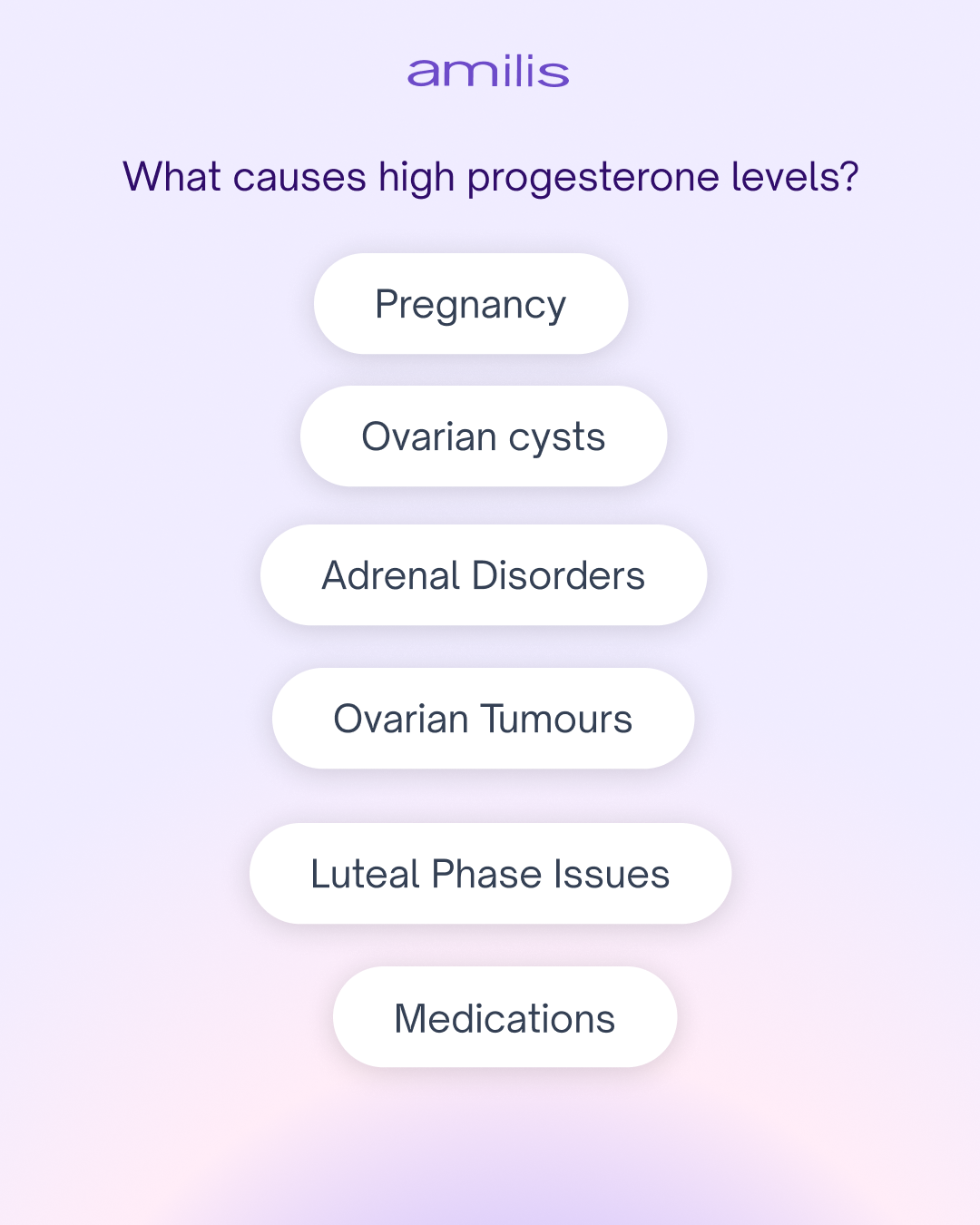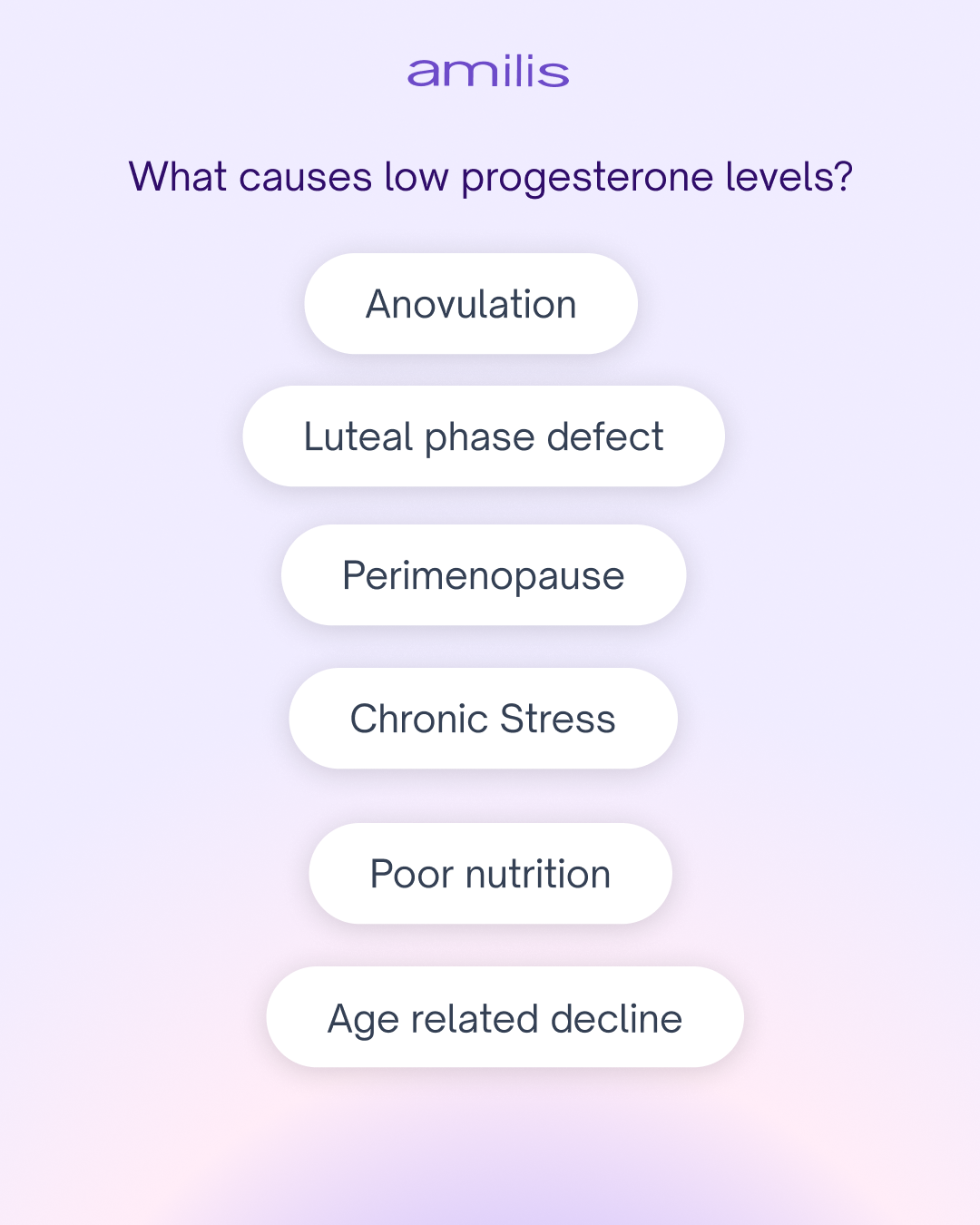Contents
- What is Progesterone?
- What does Progesterone do?
- Normal progesterone levels in females
- Normal progesterone levels by age (+chart)
- When should I take a progesterone test?
- What causes high progesterone levels?
- High progesterone symptoms
- What causes low progesterone levels?
- Low progesterone symptoms
- How to increase progesterone levels
- Progesterone and egg freezing: What's the connection?
- Progesterone test in the UK, via Amilis
- Frequently asked questions
In an eggshell...
- Progesterone is a key hormone produced mainly by the corpus luteum after ovulation
- It helps prepare the uterus for pregnancy and supports early pregnancy
- During egg freezing, progesterone levels are carefully monitored to ensure optimal timing and prevent premature ovulation
Progesterone is kind of like the end credits of your menstrual cycle (if it were a movie 🎬)
The story begins with follicles getting recruited, growing, the dominant follicle releasing the egg, and then progesterone comes rolling in.
The dominant follicle, now called the corpus luteum, secretes progesterone and helps the inner lining of the uterus grow in preparation for an embryo.
That’s also why it gets the "pregnancy hormone" status—along with preparing the uterine lining, it also helps maintain early pregnancy if conception occurs.
If you're considering egg freezing or just want to understand your fertility better, knowing about your progesterone levels is part of the fertility health puzzle.
So let's dive into everything you need to know about progesterone: what it does, what normal levels look like, when to test it, and how it connects to your egg freezing journey!
What is Progesterone?
Progesterone is a steroid hormone primarily produced by the corpus luteum (aka the dominant follicle once it's done releasing the mature egg).
After ovulation, the follicle becomes a temporary hormone-producing structure (that produces progesterone) to thicken the endometrium, or the uterine lining.
Here's a breakdown of how it works:
🥚 After ovulation: The empty follicle transforms into the corpus luteum
📈 Hormone surge: The corpus luteum starts producing progesterone
🏠 Uterine prep: Progesterone thickens your uterine lining to prepare for a potential embryo
There can be two outcomes after this:
No pregnancy: If you don't conceive, progesterone drops, triggering your period
Pregnancy: If you do conceive, progesterone continues rising to support early pregnancy
Your adrenal glands and placenta (during pregnancy) also produce small amounts of progesterone, but the corpus luteum is the main source during your menstrual cycle.
Progesterone levels are naturally low during the first half of your cycle (follicular phase) and rise significantly after ovulation (luteal phase). This rise and fall pattern is what includes progesterone in the group of hormones that control the menstrual cycle 🏢
What Does Progesterone Do?
Progesterone wears a couple of hats when it comes to your reproductive health. Here’s how it works:
Prepares the uterus for pregnancy: Progesterone transforms your uterine lining (endometrium) from a thin layer into a thicker, stable lining where an embryo can implant and grow.
Maintains early pregnancy: If conception occurs, progesterone prevents your uterine muscles from contracting and helps maintain the pregnancy until the placenta takes over hormone production.
Regulates your menstrual cycle: The rise and fall of progesterone is in sync with other hormones to control your monthly cycle. When progesterone drops, it signals your body to shed the uterine lining—aka your period.
Supports ovulation confirmation: Rising progesterone levels after ovulation confirm that an egg was actually released. This is why doctors often test progesterone about a week after suspected ovulation.
Balances oestrogen: Progesterone counteracts some of oestrogen's effects (such as avoiding endometrial lining overgrowth), helping maintain hormonal balance throughout your cycle.
Affects mood and sleep: Progesterone has calming effects on the brain and can influence sleep quality and mood, which explains why some women feel more relaxed during the luteal phase.
Influences body temperature: Progesterone slightly raises your body temperature after ovulation, which is why basal body temperature tracking is one of the ways to track and confirm ovulation.
Normal Progesterone Levels in Females
Progesterone levels change throughout your menstrual cycle, which is completely normal and expected. Here's what to expect during each phase:
The most significant change happens after ovulation—progesterone can jump from less than 1 ng/mL to over 10 ng/mL in just a few days. This rise is what confirms ovulation occurred and prepares your body for a potential pregnancy.
Normal Progesterone Levels by Age (+Chart)
As you move through different life stages, your progesterone patterns naturally change:
The key thing to remember is that "normal" depends heavily on where you are in your cycle and your life stage. A progesterone level of 15 ng/mL would be normal in the luteal phase, but concerning in the follicular phase.
When Should I Take a Progesterone Test?
Usually, progesterone is tested alongside other hormones. But if you’re testing your fertility, or if your doctor has recommended it for something specific, the timeline may vary. Here’s what to ask:
Are you trying to confirm ovulation?
This is the most common reason for progesterone testing. You'll want to test about 7 days after ovulation (around day 21 of a 28-day cycle, but this varies based on your cycle length).
For example, if you typically ovulate on day 14, you'd test on day 21. If you have a 35-day cycle and ovulate around day 21, you'd test around day 28.
On day 21 of a typical 28-day cycle, progesterone levels are expected to be above 10 ng/mL if ovulation has taken place naturally. While a value of >3 ng/mL is commonly accepted as indicative of ovulation, anything above 5-10ng/mL is considered more reliable for confirming ovulation.
Are you investigating your fertility?
You can go for a progesterone test, or your doctor might recommend one, depending on your specific situation:
- Multiple tests throughout your cycle to understand your hormonal patterns
- Specific timing based on symptoms like irregular periods or suspected luteal phase defects
- Alongside other hormone tests for a fertility assessment
Are you monitoring treatment?
If you're taking progesterone supplements or undergoing fertility treatments, your doctor will monitor levels at specific intervals to monitor the effects, dosage and timing.
What Causes High Progesterone Levels?

High progesterone levels are most common during pregnancy, but they can sometimes show up outside of that, too. Here are a few possible reasons why:
Pregnancy
This is the most common cause. Progesterone levels naturally rise during pregnancy to help support the uterus and the growing baby. These levels are much higher than what you’d normally see in a regular menstrual cycle.
Ovarian Cysts
Some cysts, like corpus luteum cysts, can produce extra progesterone. These form when the dominant follicle that released the egg (the corpus luteum) doesn’t break down as it should and keeps making hormones.
Adrenal Disorders
Conditions that affect your adrenal glands, like congenital adrenal hyperplasia, can cause your body to make too much progesterone along with other hormone imbalances.
Ovarian Tumours
In rare cases, certain ovarian tumours can produce extra hormones, including progesterone.
Luteal Phase Issues
Sometimes the corpus luteum continues to produce progesterone longer than usual, which can lead to higher levels that stick around beyond the typical second half of your cycle.
Medications
If you’re taking progesterone supplements, hormone replacement therapy, or certain fertility medications, your progesterone levels will naturally be higher.
High Progesterone Symptoms
Higher progesterone levels may show up as these signs:
- Breast tenderness and swelling - Similar to PMS symptoms, but potentially more intense
- Mood changes - You might feel more anxious, irritable, or experience mood swings
- Fatigue - Progesterone has sedating effects, so high levels can make you feel unusually tired
- Bloating and weight gain - Progesterone can cause fluid and water retention, causing bloating and mild weight gain, common in the luteal phase
- Changes in appetite - You might experience increased cravings or changes in eating patterns
- Headaches - Hormonal fluctuations can trigger headaches in sensitive individuals
- Nausea - Particularly if progesterone levels are pregnancy-level high
What Causes Low Progesterone Levels?

Low progesterone is pretty common and can happen for a variety of reasons. Here are some of the most common causes:
Anovulation (No Ovulation)
If you don’t ovulate during your cycle, your body won’t form the corpus luteum, which is what makes progesterone. This can happen due to things like PCOS, thyroid issues, high stress, sudden weight changes, or even intense exercise.
Luteal Phase Defect
Sometimes, even if you do ovulate, the corpus luteum might not produce enough progesterone or might stop too soon. The criteria for this is a shortened luteal phase of just 9 days, when it’s usually supposed to be 12-14 days. This can affect the second half of your cycle and may make it harder to get or stay pregnant.
Perimenopause
As you get closer to menopause, your hormone levels start to shift. Ovulation becomes less regular, and progesterone levels can drop, even before your periods stop completely.
Chronic Stress
When you're under constant stress, your body produces more cortisol (the stress hormone), which can interfere with progesterone production since they use similar building blocks.
Poor Nutrition
Not eating enough or missing out on key nutrients, especially healthy fats, can make it harder for your body to produce hormones like progesterone.
Age-Related Decline
As you get older, it’s normal for progesterone levels to gradually decrease, even if your cycles are still regular.
Low Progesterone Symptoms
Low progesterone levels might present as:
- Irregular or short menstrual cycles - particularly cycles shorter than 21 days or luteal phases shorter than 10 days
- Heavy or prolonged periods - Without adequate progesterone to balance oestrogen, periods can become heavier
- PMS symptoms - Mood swings, irritability, and anxiety might be more pronounced
- Difficulty conceiving - Low progesterone can make it harder to get pregnant and maintain early pregnancy
- Spotting between periods - Low progesterone can destabilise the inner lining of the uterus, causing premature spotting
- Breast tenderness - Low progesterone and higher oestrogen levels often lead to breast tissue sensitivity
- Sleep problems - Progesterone has calming effects, so low levels might affect sleep quality
- Low libido - Hormonal imbalances can affect sexual desire, though psychosocial reasons might also factor in
How to Increase Progesterone Levels
If you’ve seen low progesterone on your test results, and you’re wondering what to do next, here’s what to know: There are several ways to gently support your body and help improve your levels:
🙇Find ways to manage stress: Long-term stress can interfere with hormone production. Simple practices like deep breathing, gentle yoga, journaling, or taking time for yourself each day can really help your body regain balance.
💤Prioritise good sleep: Lack of sleep can affect the pulsatile release of hormones such as LH (luteinising hormone), and progesterone as well. Try to get 7 to 9 hours of quality sleep each night by keeping a consistent bedtime and limiting screen time before bed.
🥑Include healthy fats in your diet: Your body uses cholesterol to make hormones like progesterone. Healthy fats from foods like avocados, olive oil, nuts, and seeds can give your body the building blocks it needs.
💊Supplement if needed: You can discuss with your healthcare provider whether to include supplements such as:
- Vitamin B6, which helps with progesterone production, can be found in foods like chicken, fish, potatoes, and chickpeas.
- Magnesium, which supports hormone balance and is found in leafy greens, nuts, and seeds.
- Zinc, which plays a role in overall hormone health and is present in foods like lentils, pumpkin seeds, beef, and oysters.
🏋️Aim for a healthy weight: Being either underweight or overweight can affect ovulation and hormone levels. Gentle changes to your diet and lifestyle can help your body find its natural balance.
🧘Be consistent with exercise: Moving your body regularly is great, but extreme or high-intensity workouts every day may lower progesterone. Focus on moderate, consistent activity like walking, swimming, or cycling.
📲Talk to your doctor if needed:
If lifestyle changes aren’t enough, your doctor might suggest:
- Progesterone supplements in the form of pills, creams, or suppositories.
- Checking for conditions like PCOS or thyroid issues that can affect hormone levels.
- Ovulation-supporting medications if you’re not ovulating regularly, which can help your body naturally produce more progesterone.
Progesterone and Egg Freezing: What's the Connection?
Understanding how progesterone works during egg freezing can make the process feel a little less overwhelming and help you follow what your doctor is looking out for. Here’s the lowdown of when progesterone is checked throughout your cycle:
Progesterone Priming (Before Starting Stims)
Some clinics use progesterone before starting stimulation injections, called progesterone priming.
- What it is: Taking progesterone for a few days before your meds begin.
- Why it’s used: It can help your follicles grow more evenly and improve how your body responds to treatment, though not all clinics use it.
- Is it for you? Your doctor will decide based on your hormone levels, past cycles, and how your body usually responds.
Before Your Trigger Shot: The Critical Window
During your egg freezing stimulation, your medical team keeps a close eye on your progesterone levels. Here's why this matters:
Ideal progesterone levels: You generally want progesterone under 1- 1.5ng/mL before your trigger shot.
Why low progesterone matters: If progesterone rises too early during stimulation, it signals that your follicles are getting ready to ovulate naturally, which would mean losing those eggs before retrieval. Your doctor needs to time everything perfectly to collect the eggs before ovulation occurs.
Monitoring frequency: During your cycle, expect blood tests every 1-3 days during the final week of stimulation to track progesterone alongside oestrogen levels and follicle development via ultrasound.
After Your Trigger Shot: Expected Changes
Once you receive your trigger shot, progesterone levels naturally rise as your follicles prepare for ovulation:
Normal post-trigger levels: The morning after your trigger shot, progesterone levels range between 2.5 to over 5 ng/mL, which is completely normal, especially with certain types of trigger shots like Lupron.
Why levels rise: The trigger shot mimics your natural LH surge, which normally causes progesterone to increase as the corpus luteum forms. In egg freezing, this process is controlled and monitored.
After Egg Retrieval: Hormone Support
Once your eggs are frozen, your body needs time to settle back into its normal rhythm.
- Progesterone support: Some clinics give you progesterone (like suppositories) for a few days after retrieval.
- Why it’s helpful: It helps ease the hormonal shift and supports recovery.
- What you might feel: Most people tolerate it well. Some may feel a little bloated or notice mood changes, but these usually pass quickly.
Get Your Progesterone Tested in the UK, via Amilis
Getting your progesterone levels tested is a part of the puzzle when it comes to your fertility.
While progesterone is important, it works best when checked alongside other fertility markers like FSH, AMH, and estradiol to give you the complete picture of your reproductive health.
If you're considering testing your fertility or hormone health, here’s how you can start that journey via Amilis:
- Zero waiting times, and the option to book a full hormone panel at just £130 (50% cheaper than fertility clinics) or an AMH test at just £80 anytime, at your convenience (via Randox and accredited labs across the UK- aka, they get accepted by most fertility clinics)
- A personalised report on your hormone levels and what your hormone levels could mean for your fertility
- Get a free follow-up or book a free consultation with expert doctors and with the best fertility clinics across the UK
And the team at Amilis is here for you throughout! We’re combining the care you deserve and packaging it into every step of your fertility journey, right from the start!
Figuring out where to get started? Book a doctor consultation today or take our personalised fertility quiz to know more!
Frequently Asked Questions
Do you take progesterone before egg freezing?
Some clinics use progesterone priming before starting stimulation medications to help synchronise follicle development. This involves taking progesterone for several days before beginning injections. However, not all protocols include this step—your doctor will determine the best approach based on your individual situation and clinic protocols.
Does progesterone affect egg quality?
Progesterone itself doesn't directly impact egg quality, but it can affect the timing of egg maturation. During egg freezing, elevated progesterone levels during stimulation might indicate that eggs are maturing too quickly, which could potentially affect their quality and the success of the retrieval procedure.
What is a good progesterone level before egg retrieval?
Ideally, progesterone levels should be under 1-1.5 ng/mL before your trigger shot. Higher levels might indicate that follicles are getting ready to ovulate naturally, which could compromise the timing and success of your egg retrieval. Your medical team monitors these levels closely to ensure optimal timing.
Why do they give progesterone after egg retrieval?
After egg retrieval, some clinics prescribe progesterone to help gradually regulate your hormones back to normal levels. Since all eggs are frozen rather than transferred, progesterone supplementation can ease the hormonal transition and help your body return to its natural cycle more comfortably.
What is a good progesterone level to confirm ovulation?
To confirm ovulation, progesterone levels should typically be above 3 ng/mL (and ideally above 10 ng/mL) when tested about 7 days after suspected ovulation. This elevation indicates that ovulation occurred and the corpus luteum is producing adequate progesterone to support a potential pregnancy.



.png)



.png)


